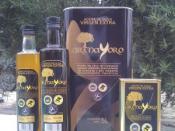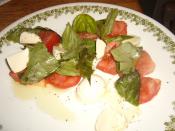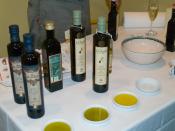1) lipids: liquid & solids
- Fats and oils are technically known as "lipids".
- If a lipid is liquid at room temperature, it is called an "oil.
- If it is solid, it is called a "fat."
2) Obesity and Weight
- Obesity increases a person's risk: diabetes, heart disease, stroke, high blood pressure, and some types of cancer
- Fat also adds satiety to our meal--a feeling of having had enough to eat. Fat-free and low-fat foods are one of the
reasons some people over-eat carbohydrates, which really packs on the pounds, cause of obesity
3) Specific Types of Fat
Saturated: Olive14% vs. Coconut 92%
Mono-unsaturated: Olive 77% vs. Coconut 6%
Poly-unsaturated: Olive9% vs. Coconut 2%
Trans: Olive0 vs. Coconut0
4) Olive Oil at a Microscopic Level
Made up of
- fatty acids
- vitamins (e)
- polyPhenols
- chlorophyll
Oleocanthal
- gives olives its specific taste
- widely used painkiller , remedying pain by reducing inflammation
- same health benefits as anti-inflammatory drugs such as ibuprofen
- reduces coronary diseases, heart disease, stroke, breast/lung cancer, and Alzheimer's disease
- But the action of oleocanthal is much weaker than that of ibuprofen.
It would take 500 grams of olive oil to get the effect of the ibuprofen dose recommended for adult pain relief.
- The newest FDA regulation (Nov. 17, 2004) permits olive oil producers to display a qualified health claim on their labels
stating that........... consuming 23 grams (approximately two tablespoons) a day of olive oil, may help reduce the risk of coronary heart disease thanks to its high monounsaturated fat content
Carcinogens & Radicals
- polyunsaturates in olives contain omega 3 and 6 fatty acids
- can't cook with the omega 3/6s: They are damaged by heat & damage us by causing mutations in DNA
- The only fats that aren't damaged by heat are saturated fats.
- importance to know how to properly handle and cook with extra virgin olive oil.
- 'smoke point' is a signal that the oil is heated at a level that compromises the overall health properties of the oil
- you should never bring the oil beyond medium heat (325 degrees) or at the point that the olive oil begins to smoke
- and is of greatest benefit when applied directly to foods
- consuming an oil that has been smoked is the nutritional equivalent to consuming trans fats
Vitamins
- Fats are an essential part of life. Without them, we could not survive. When fat is removed from a food, many of the fat-soluble compounds are also removed
- Four vitamins--A. D, E, and K--are soluble in fat; fat carries fat-soluble vitamins.
- Fat soluble vitamins generally are not broken down by cooking. They are stored in the liver and body fat for long periods so it is not essential to eat them with every meal. Because they are stored, eating too much can lead to toxicity.
Antioxidants
- flavenoid polyphenols in olive oil are natural anti-oxidants
- was assumed that taking Vitamin E supplements would do the same but oddly enough newer studies show that this is not true. It seems that you must eat the whole foods to get the benefit.
- healing sunburn, lowering cholesterol, blood pressure, and risk of coronary disease
- Studies show that people who eat antioxidant rich foods have a lower chance of getting heart disease and cancer
5) Traditional Uses
- scientific name for coconut is Cocos nucifera
- Early Spanish explorers called it coco, which means "monkey face" because the three indentations (eyes) on the hairy nut resembles the head and face of a monkey. Nucifera means "nut-bearing.
- Nearly one third of the world's population depends on coconut to some degree for their food and their economy
- highly nutritious and rich in fiber, vitamins, and minerals.
- possesses healing properties far beyond that of any other dietary oil and is extensively used in traditional medicine among Asian and Pacific populations, Pacific Islanders consider coconut oil to be the cure for all illness. The coconut palm is so highly valued by them as both a source of food and medicine that it is called "The Tree of Life."
Modern Uses
- Relives Nausea, lice, upset stomach, indigestion and diarrhoea
- fights bacteria that causes throat infections, urinary tract infections, gum disease and cavities, pneumonia, and gonorrhea
- fights viruses that cause influenza, herpes, measles, hepatitis C, SARS, and AIDS
- Kills fungi and yeasts that cause candidiasis, ringworm, athlete's foot, thrush, and diaper rash
Anti-Inflammatory
- Reduces inflammation.
- Helps protect the body from breast, colon, and other cancers
Oxidation, Radicals, Carcinogens
- Functions as a protective antioxidant. Helps to protect the body from harmful free radicals that promote premature aging
- Improves utilization of essential fatty acids and protects them from oxidation.
- Does not deplete the body's antioxidant reserves like other oils do. Does not form harmful by-products when heated to normal cooking temperature like other vegetable oils do.
Skin
- Supports tissue healing and repair.
- Supports the natural chemical balance of the skin.
- Provides protection form damaging effects of ultraviolet radiation form the sun.
Metabolism
- Helps to protect the body from Expels or kills tapeworms, lice, giardia, and other parasites.
- Supports and aids immune system function, digestion, bowel function, and absorption nutrients including vitamins, minerals, and amino acids.
- Relieves stress on pancreas and enzyme systems of the body. Improves insulin secretion and utilization of blood glucose.
- Boosts energy and endurance, Promotes loss of excess weight by increasing metabolic rate
Other
- Helps prevent periodontal disease and tooth decay.
- Reduces epileptic seizures.
- Dissolves kidney stones.
- Helps control dandruff.
6) Oxidation
- Due to polyunsats
- coconut oils resist oxidation and are highly stable
- They do not require hydrogenation, and are trans-free
- Because palm and coconut oils are semi-solid naturally, they do not require hydrogenation.
- Saturated fats have all of their hydrogens present and are the most stable which is why you can cook with them or leave them out in the air and they won't become rancid.
- heat will not tend to cause the oil to transition into dangerous trans fatty acids
- vegetable oils become rancid quickly depending on how polyunsaturated they are and produce cancer-causing free radicals the longer they remain out of their protective casings and even more when you heat them
- All oils are somewhat of a mixture between saturated, monounsaturated, and polyunsaturated fats, but coconut and palm oils stand out as the most saturated so they would have the least amount of free radicals.
- In general, tropical oils are much more healthful than oils produced in a cold climate. This is because tropical plants live at a temperature that is close to our natural body temperature. Tropical oils are stable at high temperatures. When we eat tropical oils, they don't get rancid in our tissues as the cold-climate
7) Animal Connection
- Back in the days Lard was a basic staple for cooking in the days of our forefathers.
- It was found that feeding pigs polyunsaturated fats (primarily soybean and corn oil) would put more fat on them. This is the reaction of the longer chain fatty acids found in vegetable oils
- If you feed them coconut oil, they will be very lean.
- Proven: The change from a low-fat diet to a MCT-diet is attended by a decrease in the body weight gain
- Therefore... weight loss b/c of length of FA in oils
8) MCFAs/MCT vs. LSFAs/LCT
- MCFA: FA=fatty acid & T=triglyceride therfore MCFA=MCT
- There are two methods of classifying fatty acids
1) saturated fats, monounsaturated fats, and polyunsaturated fats.
2) based on molecular size or length of the carbon chain within each fatty acid :::: short-chain fatty acids (SCFA), medium-chain fatty acids (MCFA), and long-chain fatty acids (LCFA)
- The size of the fatty acid is extremely important. Why? Because our bodies respond to and metabolize each fatty acid differently, depending on its size.
MCT
- Coconut oil is composed predominately of (MCT).
- Researchers now know that weight loss associated with coconut oil is related to the MCTs in coconut
- MCTs promote what is called thermogenesis. Thermogenesis increases the body's metabolism, producing energy.
- In 1989, Vanderbilt University::::::::The results: MCT stimulates thermogenesis to a greater degree than does excess energy as LCT, provides evidence that excess energy derived from MCT is stored with a lesser efficiency than is excess energy derived from dietary LCT
LCT
- fat found in meat, milk, eggs, and plants (including most all vegetable oils) are composed of LCT
- 98 to 100% of all the fatty acids you consume are LCT.
- LCTs are typically stored in the body as fat, while MCTs are burned for energy.
- MCTs in coconut oil are not easily converted into stored triglycerides, and MCTs cannot be readily used by the body to make larger fat molecules.
- It burns up quickly in the body, a lot like kindling on a fire. This helps boost metabolism and that helps us lose weight. The body likes to burn medium chain fatty acids (MCTs), which dominate coconut oil.
- A study published in the American Journal of Clinical Nutrition found that when we opt for oils rich in MCTs over oils donminated by long chain triglycerides (LCTs) such as corn, soy, canola, safflower, and sunflower,we burn three times more calories for six hours after a meal.
- This feature helps dieters, athletes, individuals who have difficulty digesting fat, and those with impaired immune systems.
9) Lauric Acid (Medium Chain Fatty Acid or MCFA), Mother's Milk
- is a MCT, against infection
- Coconut oil contains 50% lauric acid, in human breast milk
- prevents infection: antiviral, antibacterial and antifungal,
- boosts the immune system, metabolism and results in weight loss
10) Tumours
- In a study by Reddy (1984) ::::::: straight coconut oil was more inhibitory than MCT oil to induction of colon tumors by azoxymethane.
- Both olive oil and coconut oil developed the low levels (3%) of the adenocarcinomas in the colon, but in the small intestine animals fed coconut oil did not develop any tumors while 7% of animals fed olive oil did
11) Cholesterol-Heart Disease Connection
Introduction
- Cholesterol is a wax-like substance.
- Cholesterol play essential roles in the formation of cell membranes, some hormones, and vitamin D
Lipoproteins
- The liver makes it and links it to carrier proteins called lipoproteins that let it dissolve in blood and be
transported to all parts of the body.
- Too much cholesterol in the blood, though, can lead to problems.
- Deposits of cholesterol can build up inside arteries.
- When one or more sections of heart muscle fail to get enough blood, and thus the oxygen and nutrients they need, the result may be the chest pain known as angina. In addition, plaque can rupture, causing blood clots that may lead to heart attack, stroke, or sudden death.
- The two main types of lipoproteins basically work in opposite directions.
- Low-density lipoproteins (LDL) carry cholesterol from the liver to the rest of the body. When there is too much LDL cholesterol in the blood, it can be deposited on the walls of the coronary arteries. Because of this, LDL cholesterol is often referred to as the "bad" cholesterol.
- High-density lipoproteins (HDL) carry cholesterol from the blood back to the liver, which processes the cholesterol for elimination from the body. HDL makes it less likely that excess cholesterol in the blood will be deposited in the coronary arteries, which is why HDL cholesterol is often referred to as the "good" cholesterol.
Cholesterol-Heart Disease WEAK Connection
- While it is well known that high blood cholesterol levels are associated with an increased risk for heart disease, scientific studies have shown that there is only a weak relationship between the amount of cholesterol a person consumes and their blood cholesterol levels or risk for heart disease.
- Cholesterol in the bloodstream is what's most important. High blood cholesterol levels greatly increase the risk for heart disease. But the average person makes about 75% of blood cholesterol in his or her liver, while only about 25% is absorbed from food.
- in some studies found to raise cholesterol levels in people with low cholesterol and it lowers cholesterol levels in people with high cholesterol.
- Harvard study of over 80,000 female nurses, found that increasing cholesterol intake by 200 mg for every 1000 calories in the diet (about an egg a day) did not appreciably increase the risk for heart disease therefore >>>>>>> has shown that moderate egg consumption--up to one a day--does not increase heart disease risk in healthy individuals.(2) While it's true that egg yolks have a lot of cholesterol--and, therefore may slightly affect blood cholesterol levels--eggs also contain nutrients that may help lower the risk for heart disease, including protein, vitamins B12 and D, riboflavin, and folate.
- University of Kerala, India, 2004 ::::::. rat study concluded that virgin coconut oil might provide a potential benefit in lowering LDL ("bad") cholesterol oxidation possibly because of the polyphenol components present in the coconut oil.
- American Journal of Clinical Nutrition in May 2003, concluded::::::: in terms of the effect on HDL cholesterol, palm oil is better than the partially hydrogenated vegetable oils (trans fats), but nonhydrogenated vegetable oil is better for your health than palm oil or hydrogenated oils.
- In 1988, Dr. Istfan of Harvard University Medical School,:::: reported the use of coconut oil does not increase the role of heart disease
12) Saturated Fats ARE NOT Trans Fats
- Since tropical fats possess high levels saturated fatty acids, for years most health organizations tossed them into the saturated-fats category along with dairy and other animal fats, advising the public to limit their intake.
- Natural saturated fats have gotten a bad rap, believed to be unhealthy because of its high saturated fat content
- We got so carried away with polyunsaturated fatty acids that we promoted them to the exclusion of palm oil
- Saturated fats are not created equal. Palm and coconut oils, predominantly saturated, nevertheless are healthy oils
- But a few recent studies have been trickling in that single tropical oils out of the saturated-fat milieu. According to a 2003 review in the Asia Pacific Journal of Clinical Nutrition written by scientists of the Asia Pacific Health & Nutrition Centre, Monash University, Melbourne, Australia, palm oil contains components with nutritional and beneficial health properties. These phytonutrients include carotenoids, vitamin E, sterols, phospholipids, glycolipids and squalene. In addition, processors can recover powerful, water-soluble antioxidants, like phenolic acids and flavonoids, from palm oil mill effluent. The bottom line was that palm fruit might offer some protection against cardiovascular disease, cancers, cataracts, macular degeneration, cognitive impairment and Alzheimer's disease.
Coconut oil is now known that the "the healthiest oil on earth.


